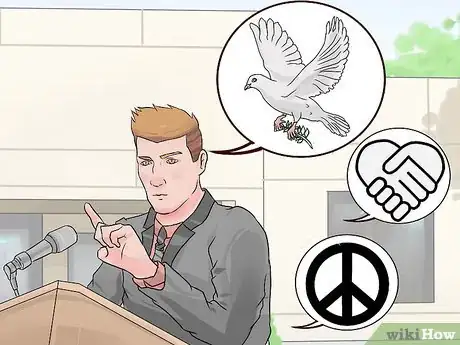This article was co-authored by Patrick Muñoz. Patrick is an internationally recognized Voice & Speech Coach, focusing on public speaking, vocal power, accent and dialects, accent reduction, voiceover, acting and speech therapy. He has worked with clients such as Penelope Cruz, Eva Longoria, and Roselyn Sanchez. He was voted LA's Favorite Voice and Dialect Coach by BACKSTAGE, is the voice and speech coach for Disney and Turner Classic Movies, and is a member of Voice and Speech Trainers Association.
This article has been viewed 100,526 times.
Are you running for president? There are some tried and true ways to write an effective campaign speech. Maybe you're running for school president or another office. You want your speech to be memorable and persuasive!
Steps
Opening the Presidential Speech
-
1Find a memorable theme. What is the one thing that you want people to remember about your speech?[1] For example, "Hope and change" was President Obama’s theme, while "Make America great again" was Donald Trump’s.
- You should make this theme simple enough that you can express it in one sentence.
- Make sure that you repeat your theme several times throughout your speech, especially in the beginning, middle, and end.
-
2Write a strong introduction. This will help you develop an immediate report with your audience and introduce your key theme. Introduce yourself by name and what position you are seeking. End the introduction with a concise preview of the issues that you plan to discuss.[2]
- You could start the speech with an anecdote, a quip or a strong quote. Don’t be afraid to offer a little humor, but it immediately clears what you would bring to the table.[3]
- When ending a speech, you could say: “If I am elected school president, I will focus on lengthening lunch hours, adding more student clubs, and reducing student fees.”
Advertisement -
3Study great campaign speeches. If you can, try to watch or listen to recordings of these speeches online. This will give you a sense of how the candidate paces themselves and where they place their emphasis. They will also give you an idea of what works and what doesn't. If you can't find recordings, you can read transcripts instead.[4]
- If you’re running for a student position, review sample student campaign speeches. There are many of these templates online.
-
4Don’t be generic or repeat boring campaign slogans that everyone else is using. Instead, figure out what sets you apart from the other candidates, such as past experiences.[5] Make sure that this point relates to the audience and your campaign promises, and reveal it to the audience early on in the speech.
- For example, if your audience is concerned about the economy, and you have training in economics, mention it--especially if your opponents do not.
- Tell the audience an anecdote relating to what sets you apart. It will make it more memorable.
Developing the Presidential Speech
-
1Organize the speech like an essay with beginning, middle, and end. Start by building rapport and introducing your theme. Include a brief summary of the key points you will address. Next, make your case by outlining your promises, the need for them, and your solution. Close by returning to the beginning and reinforcing your central theme.[6]
- If you need to, create an outline for your speech, just like you would for an essay.[7] Make it 3 parts.
- The middle of your speech should be the longest because that's where most of your content lies.
- Don't slack off on the beginning and end of your speech. Even though they are shorter, they can make your speech memorable--or forgettable.
-
2Explain the problem, focusing on 2 to 3 points. In order to get people to buy into your solutions, you need to convince them that change is needed. Stick with 2 to 3 key points. Don’t inundate the audience with too many details or nothing will seem memorable.
- You could open by saying something like: "Here are the three things we need to change."
- Be specific. Use statistics and human anecdotes to highlight the problem. However, be brief. You want to focus on solutions more than problems.
-
3Outline your solutions and stick to the positives. Focus on finding a solution rather than complaining about a problem.[8] Paint a vivid picture for the audience of what the world will be like with you as president (or your school environment). Make your promises first, then outline the need, and then return to the promises.
- Boil the speech down to 2 to 3 key issues that you plan to change. Be very specific when you outline your solutions.
- Expand on each of your key promises by detailing the problem and how you plan to address it specifically.
- Don’t make the middle of the speech too dry. Constantly reinforce your personality and theme throughout the details of your promises.
-
4Keep the speech short. Somewhere between 7 and 25 minutes is a good rule of thumb. In general, however, people tend to lose their interest after about 15 minutes.
- Go with the flow. If you notice your audience getting ants, liven up your speech or end it early.
- Stick by the event's rules. Some events may require that your speech is only 5 minutes, while others want it to be at least 30 minutes.
-
5Relate issues to your audience. You want your audience to care about the points that you are making. Find a way to directly connect your promises to their needs and experiences. For example:
- If you are talking about the Vietnam war, you can make yourself more relatable to younger generations by mentioning the soldiers who were no older than themselves.
- If you are running for high school president, say that you will ensure the administration listens to student wishes for a longer lunch break.
-
6Give the audience a sense of your background and qualifications for the job. Don’t talk endlessly about yourself, though, or it will seem arrogant. You can also emphasize your family's background, especially if you think that it will make you more relatable to your audience. For example:[9]
- If you are running for school president, mention things you’ve done that helped the school to make you seem more qualified.
- If you come from a coal mining family, and you are giving your speech in a blue-collar area, mention it! This will make you more relatable.
-
7End with a call to action. This is a principle often seen in advertising. At the end of the speech, you should urge people to take action. Tell people how critical their vote is, not only to you, but also for the platform and change that you are eager to implement on their behalf.
- For example, if you want people to join your campaign, ask them to vote for you. Be sure to thank them for their consideration as well.
Delivering the Presidential Speech
-
1Decide on the tone for your speech. While you want your speech to sound conversational, you also want to bring some energy into it through tone. Your tone can be angry, rallying, reinstating, and so forth. You can even change your tone over the course of your speech.
- Some speeches play to people’s fears and anger, but the best ones remain positive and play toward people’s optimism. People want to know how you will improve things.
- Keep your tone conversational. You don’t want it to sound like you are too rehearsed or reading from a piece of paper.[10]
-
2Keep your sentences short. Remember that you are writing for the ear, not the eye. People process less information through hearing than reading. So, keep your sentences short.
- This is why broadcast writing is less dense than print writing, generally. When writing a speech, keep the sentences concise.
- Try to use one direct point per sentence. People can understand complex topics better when they are reading.
-
3Write like people talk. People don’t back into sentences with endless opening clauses generally. Use strong verbs and active, not passive, voice. Read your speech out loud as you write it so you can make sure it sounds conversational.
- You don’t need to fixate on proper grammar, punctuation, and so forth in a speech that will be given verbally (and presidential speeches are designed to be spoken).
- It’s more important to capture the cadences and colloquialisms of regular speech, while staying true to yourself.
-
4Show passion. No one wants to vote for someone who sounds dry, boring and cold. Take off your professor’s hat, and speak with emotion that appeals to the common man or woman. Figure out the emotional response you want to create in your audience and then use sensory language and anecdotes to create it.
- Ancient philosophers who perfected the art of rhetoric called this “pathos.” An appeal to the emotions.
- The philosophers believed that the core of any persuasive speech should be logos (an appeal to reason). However, they believed that speeches without pathos failed to move.
-
5Practice the speech, don’t wing it. While you want your speech to sound natural and spontaneous, you will want to be prepared for it. This will make you seem more professional, confident, and authoritative.[11] It's okay to have notes or an outline, but try not to rely on them.
- Have a clear idea of what you want to say. Keep the finest details confined to notes so that you can refer to them if you need to.
- Remember that giving a speech is theater. You need to be dramatic and show passion, but you don’t want to stumble over words or look down like you’re reading it.
-
6Remain civil, especially with your opponents. The biggest mistake you can make is by attacking your opponents. It will make you seem smaller, and it risks building them up. Instead, focus on your own platform, what you will change, and how you plan on doing that. Talk about the qualifications that you bring to the job.
- They say that when people get in trouble, it’s usually because they went negative.
-
7Try a joke, but don't make it offensive. Putting a joke into a speech is risky, because if it’s not funny, you can fall flat and create an awkward moment. If you pull it off, however, a joke can make your audience connect with you and this is a key to an effective speech.
- The best place to include a joke is in the opening of your speech. Create a rapport with the audience and use a joke that is specific to the location.
- Stay away from any offensive jokes and make sure a joke is appropriate to the occasion.
-
8Tell stories or anecdotes to help the audience identify with you. This will also make your points more persuasive. For example, if you are promising to deliver on a certain campaign point, the anecdote can humanize the topic and show why change is needed. It can also illustrate the human importance of voting for you.
- Show, don't tell. Show your telling points with vivid human stories or a relatable anecdote.
Expert Q&A
-
QuestionHow do you start writing a speech?
 Patrick MuñozPatrick is an internationally recognized Voice & Speech Coach, focusing on public speaking, vocal power, accent and dialects, accent reduction, voiceover, acting and speech therapy. He has worked with clients such as Penelope Cruz, Eva Longoria, and Roselyn Sanchez. He was voted LA's Favorite Voice and Dialect Coach by BACKSTAGE, is the voice and speech coach for Disney and Turner Classic Movies, and is a member of Voice and Speech Trainers Association.
Patrick MuñozPatrick is an internationally recognized Voice & Speech Coach, focusing on public speaking, vocal power, accent and dialects, accent reduction, voiceover, acting and speech therapy. He has worked with clients such as Penelope Cruz, Eva Longoria, and Roselyn Sanchez. He was voted LA's Favorite Voice and Dialect Coach by BACKSTAGE, is the voice and speech coach for Disney and Turner Classic Movies, and is a member of Voice and Speech Trainers Association.
Voice & Speech Coach First, define what your role is in writing the speech. Are you the main speaker? Are you the subsidiary? Secondly, start to brainstorm your ideas and write them down. After, you can edit your ideas down to a clear piece.
First, define what your role is in writing the speech. Are you the main speaker? Are you the subsidiary? Secondly, start to brainstorm your ideas and write them down. After, you can edit your ideas down to a clear piece. -
QuestionWhat if the competitors I am going against are at the same level as me?
 Community AnswerFind a way to differentiate yourself from your competitors. What do you have that they don't have? What are your big ideas? What sets you apart? Don't say anything bad about your opponents, talk about your own strengths instead.
Community AnswerFind a way to differentiate yourself from your competitors. What do you have that they don't have? What are your big ideas? What sets you apart? Don't say anything bad about your opponents, talk about your own strengths instead. -
QuestionHow can you create an emotional response in the audience?
 Community AnswerUse human anecdotes that relate to people like those in your audience. If you are speaking to a group of students, tell them a story about a fellow student. Relate to them by explaining why you understand their issues. Relate the issues back to their needs. Use sensory language and verbs that create emotion.
Community AnswerUse human anecdotes that relate to people like those in your audience. If you are speaking to a group of students, tell them a story about a fellow student. Relate to them by explaining why you understand their issues. Relate the issues back to their needs. Use sensory language and verbs that create emotion.
References
- ↑ https://blog.prepscholar.com/good-persuasive-speech-topics
- ↑ Patrick Muñoz. Voice & Speech Coach. Expert Interview. 12 November 2019.
- ↑ https://www.youtube.com/watch?v=h6sm47j-Am4
- ↑ http://presidentialrhetoric.com/campaign2012/index.html
- ↑ https://blog.prepscholar.com/good-persuasive-speech-topics
- ↑ Patrick Muñoz. Voice & Speech Coach. Expert Interview. 12 November 2019.
- ↑ Patrick Muñoz. Voice & Speech Coach. Expert Interview. 12 November 2019.
- ↑ https://open.lib.umn.edu/publicspeaking/chapter/17-3-organizing-persuasive-speeches/
- ↑ http://grammar.yourdictionary.com/style-and-usage/writing-a-school-election-speech.html
















































































